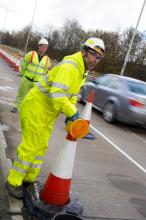A new campaign is getting underway in Kenya that aims to boost road safety and cut crashes. This simple campaign employs a straightforward approach, using stickers to encourage passengers to speak up and tell taxi drivers to slow down. Called Zusha!, the Swahili word for protest, the campaign uses stickers placed on vehicles, encouraging taxi passengers to tell drivers to drive more carefully. Kenya’s 14 seat passenger vehicles are known as matutus and the drivers are notorious for speeding and reckless dri
A new campaign is getting underway in Kenya that aims to boost road safety and cut crashes. This simple campaign employs a straightforward approach, using stickers to encourage passengers to speak up and tell taxi drivers to slow down. Called Zusha!, the Swahili word for protest, the campaign uses stickers placed on vehicles, encouraging taxi passengers to tell drivers to drive more carefully. Kenya’s 14 seat passenger vehicles are known as matutus and the drivers are notorious for speeding and reckless driving.
A recent study by James Habyarimana and William Jack, has suggested that the sticker campaign in Kenya was able to reduce insurance claims by as much as one third. The Zusha! Campaign has set out a low cost way to make a big impact. There are plans to increase the campaign right across Kenya and also to expand it into other East African nations that suffers similar road safety issues.
The Zusha! campaign also includes media components that will raise awareness about the project and road safety, including radio advertisements, billboards, and social media outreach. The campaign is supported by members of the National Road Safety Trust, USAID, and Georgetown University, and is being implemented with the help of Directline Assurance and the National Transportation Safety Authority.
This scale-up of Zusha! follows two highly successful research trials conducted by Professors William Jack and James Habyarimana of Georgetown University in Washington, DC. Between 2007 and 2013, results from two randomized control trials proved that the PSVs in which Zusha! stickers were placed had between 25-50% fewer insurance accident claims, translating into 140 avoided crashes and saved 55 lives annually.
Traffic crashes account for around 1.3 million deaths/year across the globe, many of which take place in the developing world. For this reason, USAID’s Development Innovation Ventures awarded a $3 million grant to Zusha! in November 2014. This campaign is being backed by the US Agency for International Development.
In sub-Saharan Africa, road deaths are the leading cause of death for people aged 15-29 and the second leading cause of death for people ages 5-14. Many of these deaths occur in minibuses, the primary mode of transportation in the region. Often, crashes occur because of reckless driving such as speeding and dangerous overtaking. Solutions to this road safety problem, like speed governors, complaint hotlines, or increased traffic enforcement, however, can be extremely expensive. And such efforts do not provide the passenger with the power to ensure their own safety at the moment of dangerous driving.
The study can be found %$Linker:2 External <?xml version="1.0" encoding="utf-16"?><dictionary /> 0 0 0 oLinkExternal here Visit study page false http://www.pnas.org/content/early/2015/08/05/1422009112.full.pdf false false %>.
A recent study by James Habyarimana and William Jack, has suggested that the sticker campaign in Kenya was able to reduce insurance claims by as much as one third. The Zusha! Campaign has set out a low cost way to make a big impact. There are plans to increase the campaign right across Kenya and also to expand it into other East African nations that suffers similar road safety issues.
The Zusha! campaign also includes media components that will raise awareness about the project and road safety, including radio advertisements, billboards, and social media outreach. The campaign is supported by members of the National Road Safety Trust, USAID, and Georgetown University, and is being implemented with the help of Directline Assurance and the National Transportation Safety Authority.
This scale-up of Zusha! follows two highly successful research trials conducted by Professors William Jack and James Habyarimana of Georgetown University in Washington, DC. Between 2007 and 2013, results from two randomized control trials proved that the PSVs in which Zusha! stickers were placed had between 25-50% fewer insurance accident claims, translating into 140 avoided crashes and saved 55 lives annually.
Traffic crashes account for around 1.3 million deaths/year across the globe, many of which take place in the developing world. For this reason, USAID’s Development Innovation Ventures awarded a $3 million grant to Zusha! in November 2014. This campaign is being backed by the US Agency for International Development.
In sub-Saharan Africa, road deaths are the leading cause of death for people aged 15-29 and the second leading cause of death for people ages 5-14. Many of these deaths occur in minibuses, the primary mode of transportation in the region. Often, crashes occur because of reckless driving such as speeding and dangerous overtaking. Solutions to this road safety problem, like speed governors, complaint hotlines, or increased traffic enforcement, however, can be extremely expensive. And such efforts do not provide the passenger with the power to ensure their own safety at the moment of dangerous driving.
The study can be found %$Linker:





